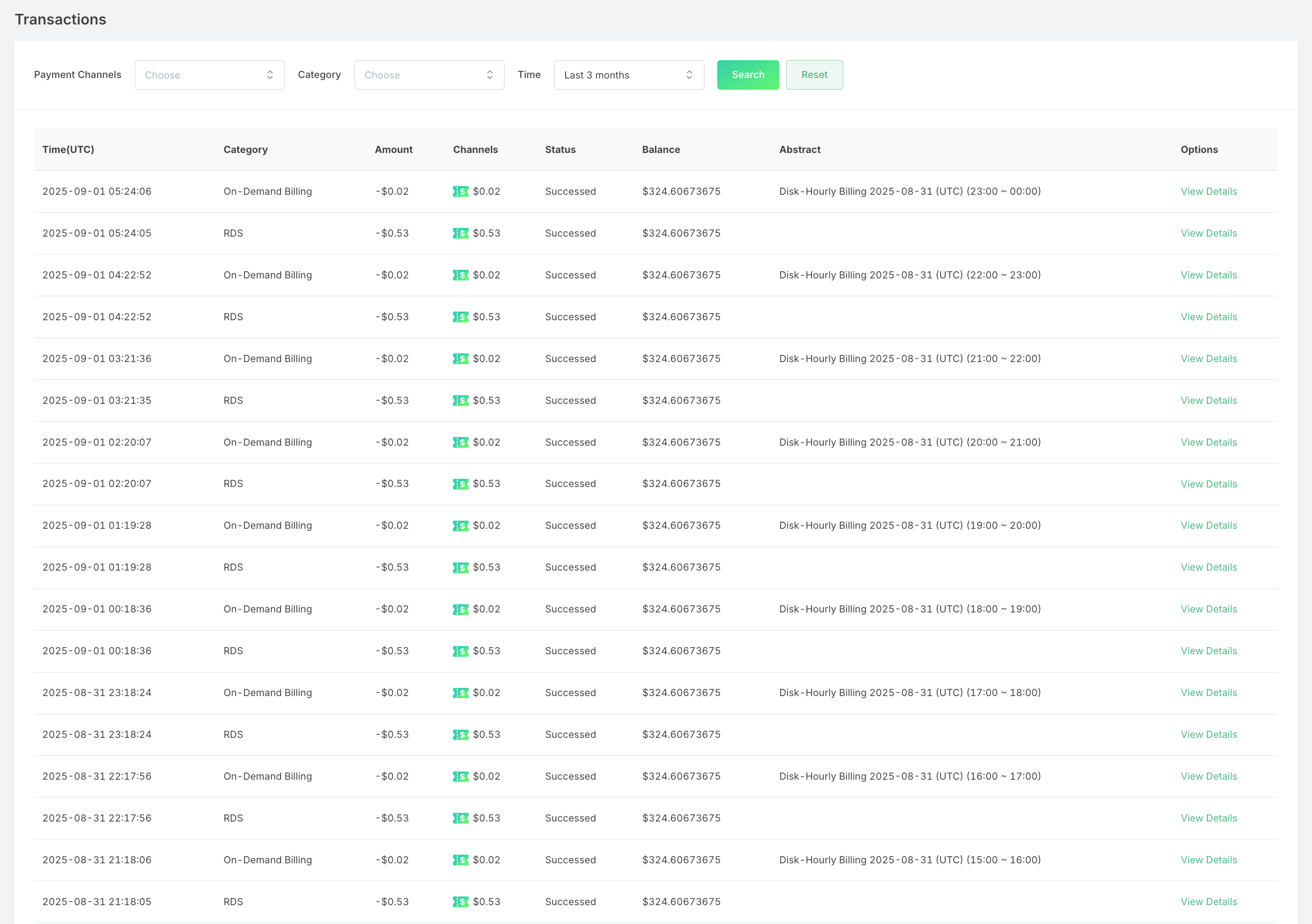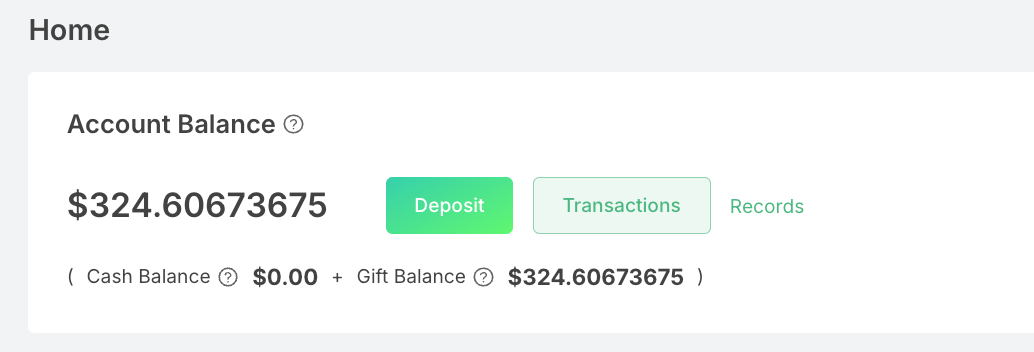RDS Billing
This documentation provides detailed information about the billing system for PostgreSQL RDS services, including payment methods, billing cycles, and how to monitor your expenses.
Billing Overview
The PostgreSQL RDS service uses a transparent billing model that charges based on:
- Instance type and specifications (CPU, RAM)
- Storage usage
- Additional features (backups, high availability)
- Network data transfer
Billing occurs on an hourly basis, with detailed transaction records available for review.
Hourly Transactions

The hourly transactions view provides a detailed breakdown of charges incurred for your RDS instances:
- Transaction Time: Timestamp for each billing event
- Service Type: Categorized as either "RDS" (for compute resources) or "Disk-Storage" (for storage resources)
- Instance ID: Unique identifier for the specific RDS instance
- Resource Details: Information about the resources being billed
- Amount: Cost incurred for the specific resource during that hour
- Status: Current status of the transaction
Key Features:
- Granular Visibility: Track expenses on an hourly basis
- Service Categorization: Separate tracking for compute and storage costs
- Filtering Options: Filter transactions by date range, service type, or instance ID
- Export Capability: Download transaction history for accounting purposes
Cash Balances

The cash balances section displays your current account balance, which is used to pay for RDS services:
- Total Balance: The combined amount available for service payments
- Gift Cash: Promotional credits or bonuses added to your account
- Real Cash: Actual deposited funds in your account
Balance Management:
- Automatic Deduction: Service costs are automatically deducted from your balance
- Low Balance Alerts: Notifications when your balance falls below a specified threshold
- Payment History: View all deposits and withdrawals from your account
- Auto-Recharge: Optional feature to automatically add funds when balance is low
RDS Vouchers

DS vouchers are special credits that can only be used for PostgreSQL RDS services:
- Voucher ID: Unique identifier for each voucher
- Amount: The monetary value of the voucher
- Expiration Date: The date after which the voucher becomes invalid
- Status: Whether the voucher is active, partially used, or expired
- Usage Restrictions: Any limitations on how the voucher can be applied
Voucher Priority:
- When an RDS service incurs a charge, the system first attempts to use available RDS vouchers
- If vouchers are depleted or unavailable, the system deducts from gift cash
- If gift cash is depleted, the system deducts from real cash balance
Voucher Management:
- Redeem Vouchers: Apply voucher codes received from promotions
- Transfer Vouchers: Some vouchers may be transferable between accounts
- View History: Track how vouchers have been applied to services
Billing Cycles and Payment Methods
Billing Cycles:
- Hourly Billing: Resources are billed on an hourly basis
- Monthly Statement: A comprehensive statement is generated at the end of each month
- Annual Contracts: Optional discounted rates for long-term commitments
Payment Methods:
- Credit/Debit Cards: Add and manage payment cards
- Bank Transfer: Deposit funds via bank transfer
- Online Payment Services: Use supported online payment platforms
- Enterprise Billing: Special invoicing options for business customers
Cost Management Tools
Cost Estimation:
- Price Calculator: Estimate costs before provisioning resources
- Budget Setting: Set monthly budget limits for RDS services
- Cost Alerts: Receive notifications when approaching budget thresholds
Cost Optimization:
- Rightsizing Recommendations: Suggestions for optimizing instance types
- Idle Resource Detection: Identification of underutilized instances
- Reserved Instance Options: Discounted rates for committed usage
Billing Support
For billing-related inquiries or issues:
- Billing Support: Dedicated support for billing questions
- Dispute Resolution: Process for addressing billing discrepancies
- Invoice Requests: Request formal invoices for accounting purposes
Frequently Asked Questions
Q: When am I charged for my RDS instances?
A: Charges begin when your RDS instance enters the "available" state and continue until it is deleted or terminated.
Q: How are partial hours billed?
A: Resources are billed on a per-second basis, with a minimum charge of one minute.
Q: What happens if my account runs out of funds?
A: You will receive multiple notifications before your balance is depleted. If your account reaches zero, your instances may be suspended until payment is made.
Q: Can I get a refund for unused services?
A: Refunds are handled on a case-by-case basis according to the service terms and conditions.
Q: How do I update my payment information?
A: Payment information can be updated in the Account Settings section of the cloud console.